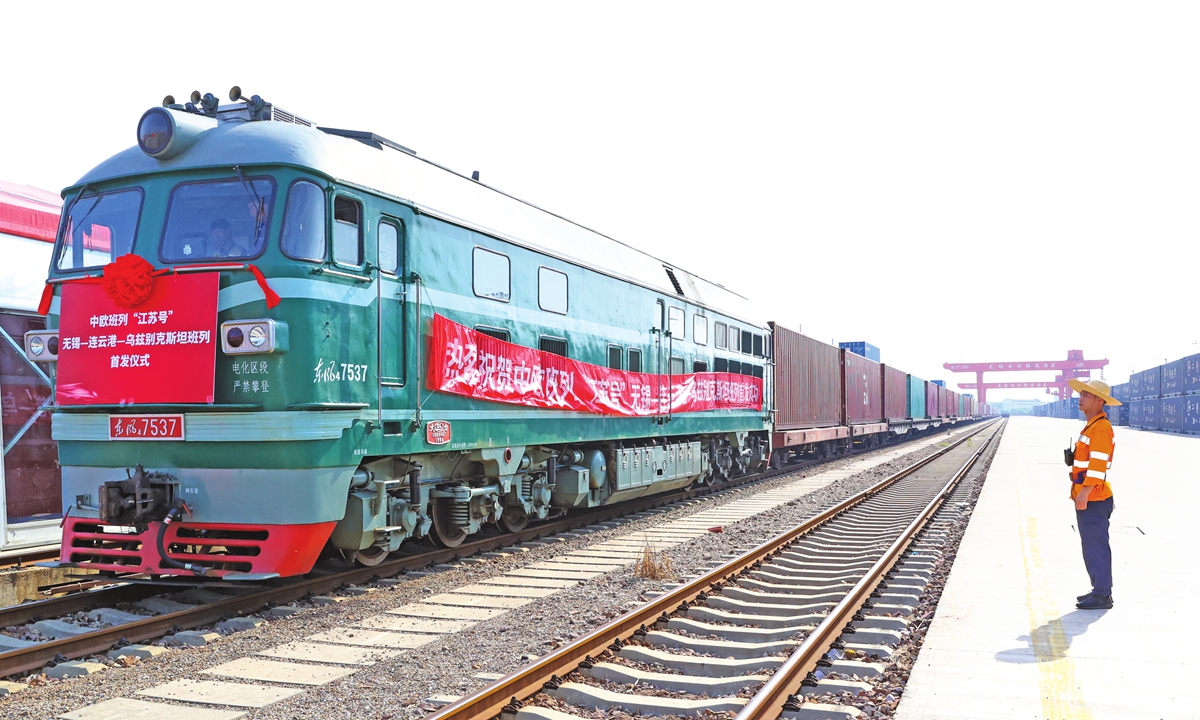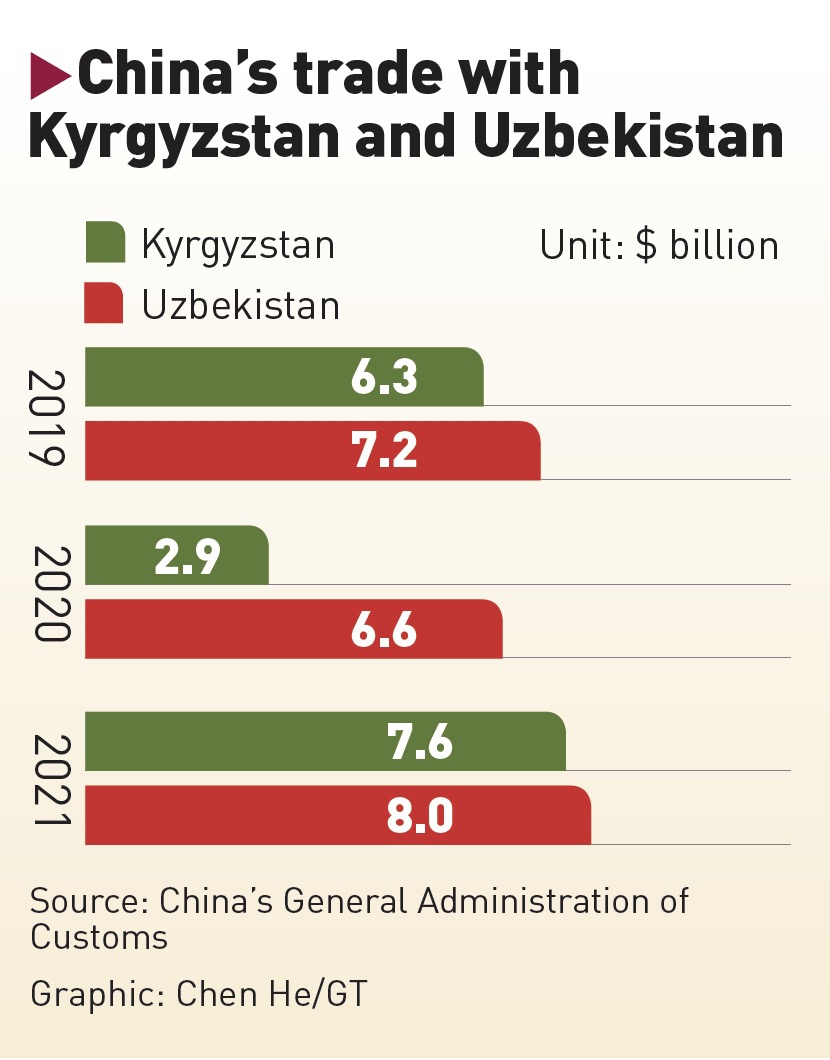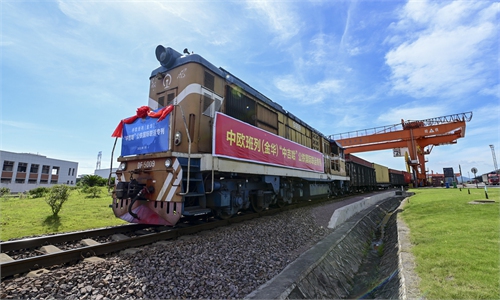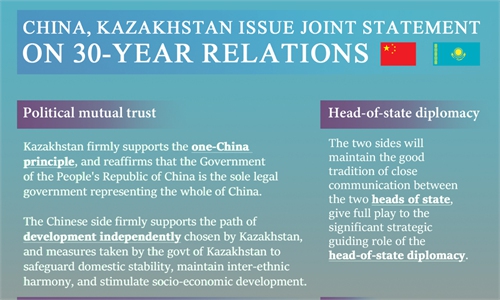China-Kyrgyzstan-Uzbekistan railway to open ‘southern Eurasia corridor,’facilitates BRI cooperation with Central Asia: analysts
Highly anticipated project facilitates BRI cooperation with Central Asia, spurs Xinjiang’s growth: analysts

The Wuxi-Lianyungang-Uzbekistan freight train departs Wuxi in East China's Jiangsu Province on August 13, 2022. Photo: VCG
A cooperation agreement on the China-Kyrgyzstan-Uzbekistan (CKU) railway construction project could reportedly be signed at the Shanghai Cooperation Organization (SCO) summit held from Thursday to Friday in Samarkand, Uzbekistan, marking new groundbreaking moment in the development of the long-anticipated rail line after nearly 20 years of negotiation.
Chinese President Xi Jinping said in a meeting with Kyrgyz President Sadyr Zhaparov on Thursday that China supports the China-Kyrgyzstan-Uzbekistan railway project and is ready to push for an early start of the construction of the project. China also supports more outstanding Chinese enterprises to invest in Kyrgyzstan and will facilitate the exchange of personnel and customs clearance of goods between the two countries, Xinhua News Agency reported.
The CKU deal could be one of the most important results of this year's SCO summit, offering a glimpse into a full-fledged cooperation based at the multilateral platform, ranging from security to infrastructure and regional economic collaboration, analysts said.
The stakes for the rail project are high, as it sets in motion a "southern" inland corridor between China and Europe which could extend further to Middle East in the future, adding to the current "northbound" route that transits through Russia and Kazakhstan that the China-Europe freight trains currently ride on and jointly constituting a new strategic Eurasia logistic network along the Belt and Road Initiative (BRI) route.
The establishment of an overarching transportation hub contributes to the economies of landlocked Kyrgyzstan and Uzbekistan as well as other Central Asian countries along the BRI route. It also boosts the connectivity of Northwest China's Xinjiang Uygur Autonomous Region, which borders a number of Central Asian countries including Kazakhstan, Kyrgyzstan, and Tajikistan, and facilitates its opening-up and economic development, according to observers.
According to the Kyrgyz President's press office, transportation authorities of Kyrgyzstan and Uzbekistan, as well as China's National Development and Reform Commission, the country's top economic planner, have jointly signed the CKU (Kyrgyzstan section) construction cooperation agreement within the SCO summit framework, Sputnik News reported.
The three parties will make joint efforts to support the railway's feasibility study conducted by China Railway First Survey and Design Institute Group, which is due to be completed by June 1, 2023, the report said.
"This could be a landmark step in the railway's development and one of the most important multilateral economic cooperation projects yielded by SCO. The start of the project also will present new opportunities in regional economic cooperation based on SCO framework and China-Central Asia cooperation under BRI," Zhao Huirong, an Eastern European studies expert from the Chinese Academy of Social Sciences, told the Global Times on Thursday.
A 'southern' route
Analysts have highlighted the new railway's potential geo-economics punctuation and strategic importance, given the backdrop of Russia-Ukraine conflicts and mounting global geopolitical tensions.
The CKU railway is regarded as the "southern" land-based route in Eurasia continental transportation network, and the line could be extended to Middle East and even Pakistan and Afghanistan in the future, therefore functioning as a significant supplement to the "northern" inland passage between China and Europe amid rising demands.
According to a report by the Diplomat, the CKU railway will become one of the shortest routes to send cargo to both Middle East and European markets as it will shorten the freight journey by 900 km and save seven or eight days in shipping time.
Logistics companies, some of whose business have experienced "minor fluctuations" due to the Russia-Ukraine conflict, have expressed keen interest in the opening of the new transportation route.
The bulk of China-Europe freight train, a main pillar of trade between the two economies, currently transports goods through the northern passage that travels via Kazakhstan and Russia. In August, the 10,000th freight train connecting China to Europe this year arrived in Hamburg, mirroring a monumental increase in bilateral cargo demand.
"The CKU railway enriches China-Europe freight train lines, and will significantly improve the resilience and anti-risk ability of China-Europe freight train, and guarantee the sustainable rail cargo trade between China and Europe," Qi Dan, general manager of Yuxinou Logistics based in Southwest China's Chongqing Municipality, told the Global Times on Wednesday, noting that the company will further expand the scope of business and develop Central Asian market.

China's trade with Kyrgyzstan and Uzbekistan Graphic: Chen He/GT
A radiation effect
Analysts also expect the railway to augment Xinjiang's outbound international route from one to two, injecting a much-needed boost to spur Xinjiang's economic vigor and accelerate its opening-up push amid vicious Western smearing and sanction against the region.
According to a report by news portal guancha.cn, southern Xinjiang, which borders Kyrgyzstan, does not currently have a cross-border rail line, with only one cross-border highway that connects with Kyrgyzstan and Pakistan.
"More trade and logistic collaboration will develop in Xinjiang after the railway is put into operation," Zhao said, while noting that such opportunities also abound for landlocked Kyrgyzstan and Uzbekistan, whose exports to Asia-bound markets currently rely on transit by Kazakhstan, which not only incurs higher cost but also takes longer shipping time.
"The rail line is conducive to expanding the exports of the two countries' agricultural and mineral products," Zhao noted. The two nations could also elevate incomes and increase employment, taking advantage of the transit dividends.
It is estimated that the annual cargo volume of the CKU railway could hit 13 million tons, among which 80 percent will be transit cargo within the border of Kyrgyzstan. And that translates to a $200 million increase in Kyrgyzstan's transportation incomes a year, the Economic Daily reported, citing economists.
But still, analysts stressed that for the railway plan to press ahead, the involving countries should work together to overcome technical problems concerning the rail gauge and standard, financing as well as security issues.
"The northbound rail line adopts different rail standard, causing inconvenience in cross-border transportation. It is hoped that the three parties could reach consensus on a unified rail standard… but this still depends on the cost and actual situation," Zhao added.
According to the Sputnik News report, the three countries plan to sign a triple feasibility study financing agreement to share the cost equally.



